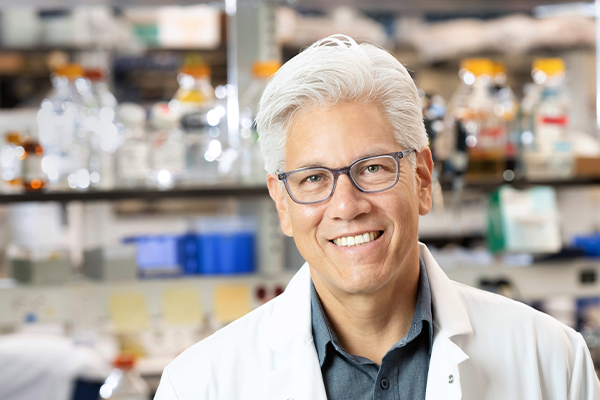
Chair Raphael Valdivia, PhD, is overseeing the restructuring of Duke University School of Medicine’s immunology department to reflect the increased importance of immunity and inflammation in all aspects of human health.
A name change, approved by the University in April, to the Department of Integrative Immunobiology captures a changing landscape in immunology research, one that’s given rise to immunotherapy treatments that trigger the immune system to fight cancer, and the emergence of inflammation as a key factor in cardiovascular disease, cancer, Alzheimer’s disease, obesity, diabetes, and a variety of infectious diseases including HIV/AIDS.
“At their core, most diseases are the result of inflammation or a dysregulation of the immune system,” Valdivia explained. “Even major basic science disciplines like microbiology, development biology, and neurosciences are all shaped by the immune system.”
The former vice dean of basic science and professor of molecular genetics and microbiology leads a basic science discipline whose roots at Duke University trace back to the 1960s before being formally established as a department in 1992. Today it encompasses a broad research scope of contemporary immunobiology and applied immunology.
Work on the department’s transformation began in July 2022 with an advisory group and faculty members collaborating on how they would like to see immunology shaped in the future.
Since then, three main themes of future research goals emerged for the new Department of Integrative Immunobiology:
-
Training the next generation of basic scientists to be adept at spanning the spectrum of basic and translational sciences.
-
Achieving better integration with the clinical enterprise to answer the next big questions in basic science.
-
Expanding into translational dimensions of research including drug discovery, generation of biologicals and cell therapies, and vaccines.
In announcing the name change, School of Medicine Dean Mary Klotman, MD, said the Department of Integrative Immunobiology will form stronger bonds with the school’s eight basic science departments and 17 clinical departments as it translates basic science discoveries into therapies.
It will also integrate with clinical entities like the Duke Human Vaccine Institute, surgical sciences, and the Duke Cancer Institute as the department’s focus in research and training evolve to include the translation of knowledge to the cure and prevention of diseases.
Changing Culture
A large part of the restructuring will rely on cultural changes. “We are re-thinking how we approach research, how we approach training, and what our role in society as scientists is,” Valdivia said.
The department has traditionally relied on model systems to understand the immune system, but there’s a need to integrate with clinical partners to apply this knowledge to human populations.
Physicians “can see when the immune system is a component or cause of a disease and tell us ‘You really should be studying this,’” Valdivia said.
The integration will require a cultural change to view applied science — for example, the generation of new cellular therapies for the treatments of cancers or new vaccines — as valuable as the discovery of basic principles in immunity.
“For the basic scientist of the future to be successful and competitive, their work will have to increasingly have an anchor in human disease,” Valdivia explained. “The next generation of basic scientists will have to be comfortable making basic discoveries and translating these into products and therapies.”
One of the first hires of the newly named department was Jose Conejo-Garcia, MD, PhD, a tumor immunologist who is pioneering the use of antibody and cellular therapies for the treatment of epithelial cancers. As new faculty searches begin in October, the department will look for basic scientists who can address questions of clinical importance.
The expanded research will be matched with revisions in training requirements. New graduate students entering immunology programs are seeking to apply their research to cure diseases and want to see their findings reach clinics faster. It’s led some scientists to leave the relatively slow pace of academia to move into industry after earning their PhD.
“We need to adjust how trainees are taught, imparting skills in addition to logical thinking such that they’re up to date on the latest technologies and are adaptable to embrace new ones as they emerge,” Valdivia said.
The stage is set for more growth in a department that already has strengths in infectious diseases, vaccine research, lymphocyte biology, neuroinflammation, and applied immunology.
“Our mission is to understand the immune system, but with a purpose,” said Valdivia. “We want to integrate clinical observations with fundamental cellular molecular mechanisms of immunity. In the process we are committed to training the next generation of scientific leaders, who are not just outstanding scientists, but also outstanding citizens.”